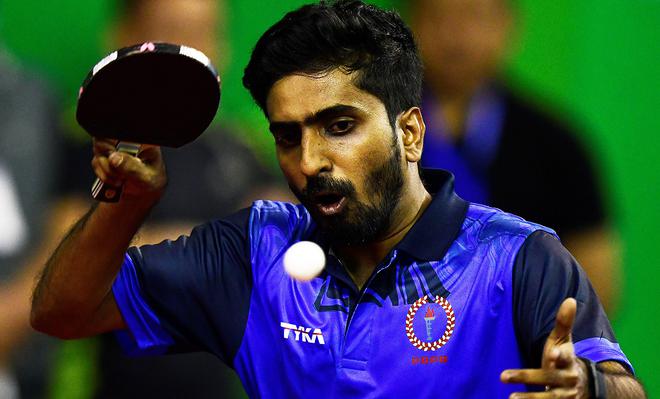The Shree Shiv Chhatrapati Sports Complex — off the Mumbai-Bangalore National Highway’s Pune bypass — is constantly buzzing with activity. But the presence of a majority of top athletes in an extended suburb goes unnoticed for the locals.
The return of the Ultimate Table Tennis (UTT), after a prolonged, pandemic-induced break, is no exception. Except for a handful of table tennis fraternity, there is hardly any awareness of the fact that the likes of A. Sharath Kamal, Manika Batra and G. Sathiyan will be rubbing shoulders with and against top paddlers across the globe in table tennis’ IPL avatar.
But the table tennis circle is excited at its core, with the return of UTT after almost four years. When pandemic hit in 2020, not too many were optimistic about whether UTT, founded in 2017 with 11 Sports’ Vita Dani and Arjun Award-recipient Niraj Bajaj as its promoters, would witness its fourth edition.
But Dani and Bajaj were confident about getting the league back on track as soon as normalcy returned and UTT was granted a window by the International Table Tennis Federation.
No wonder then Bajaj, a business tycoon, is unwilling to admit that UTT is being revived this year. “I don’t think this should be called a revival as Covid was in nobody’s hand. We had to accept what was happening and we are glad we could move ahead from those experiences,” Bajaj told The Hindu on Thursday.
Ask Bajaj whether 2023 was more challenging than the first edition in 2017 and he has no doubts in his mind.
“2017 was a challenge initially as we did not have the concept of the league back then. We built the ecosystem, including getting foreign players, having enough Indian players, teams and pulling stakeholders together including for broadcast, it was a work in progress”Niraj Bajaj
“But today as we are all geared to host the fourth edition, I think there is enough belief in the ecosystem when it comes to Indian table tennis’ growing perception as well as the existence of IndianOil Ultimate Table Tennis. Strong and committed sponsors and team owners, the emergence a steady pool of upcoming Indian players other than the known and celebrated stars and the eagerness of foreign players to be part of UTT say much about how much the event has come through in the last three editions.”
Cynics of the franchise-based league — and there are a few in Indian table tennis — may see the rise of India’s stature in the international table tennis arena and the introduction of UTT as a sheer coincidence. But the fact that UTT has contributed immensely to India’s success at the international level cannot be denied.
Since 2017, India has had a steady crop of top paddlers performing consistently at the international level. Sharath and Sathiyan have been vocal about how the league has helped paddlers.
It’s not just about the confidence of playing with and against overseas paddlers that has helped the Indians. Even in terms of skill and tactics, India’s top and promising paddlers have made spending three weeks along with the pros count.
Sanil Shetty, who has been a part of successive Commonwealth Games squads, cites an example of how a tip from Par Gerell, the Swedish star who was his teammate in the inaugural edition in 2017, has changed the way he approaches close situations in a match.
When the score is 9-9 or 10-10, at crunch point, the body naturally stiffens and it results in even the seasoned pros committing an unforced error.
“I had noticed Par doesn’t let it happen to him, so I asked him how he manages it. ‘Especially at crunch time, I tell myself the score is love-all rather than nine-all.’ I tried implementing it immediately and ever since I can give my best even when the team is in a tight spot,” says Sanil who will represent UTT debutant Bengaluru Smashers in Season 4.

Sathiyan adds that he is flooded with queries from overseas paddlers about playing UTT. “Most of the professionals are looking forward to being a part of UTT. The short window and the manner in which everyone is treated royally — with five-star accommodation, best of playing conditions — is a massive boost,” says Sathiyan, who is a regular in Bundesliga.
The lack of interest from the locals — at least for the initial phase notwithstanding — the UTT promoters are focusing on widening the reach through telecast, live-streaming and on social media.
“We are continuously working to make UTT bigger every day, right from creating experiential campaigns targeting not only table tennis enthusiasts but also a broader demography of sports fans in general”Niraj Bajaj
Besides launching ‘Every Table in a Playground’ campaign along with the broadcaster, UTT has introduced the game to Metaverse with Aatral as its partner, in a bid to “revolutionise fan engagement,” states Bajaj.
“Fans this season will be able to play table tennis-themed four mini games which is a first-of-a-kind for the game as well as the fans to explore and engage through VR and AI,” he says.
“UTT in the past has registered an average of 20 million viewership for the first three seasons and 38 million video views via the social handles of the league. The ‘Every Table is a Playground’ campaign has been launched across social media and it has already been getting noticed.”
With the Asian Games just a few weeks away, the top paddlers will be hoping that the locals and the fans also lap up the tournament over the next fortnight.







